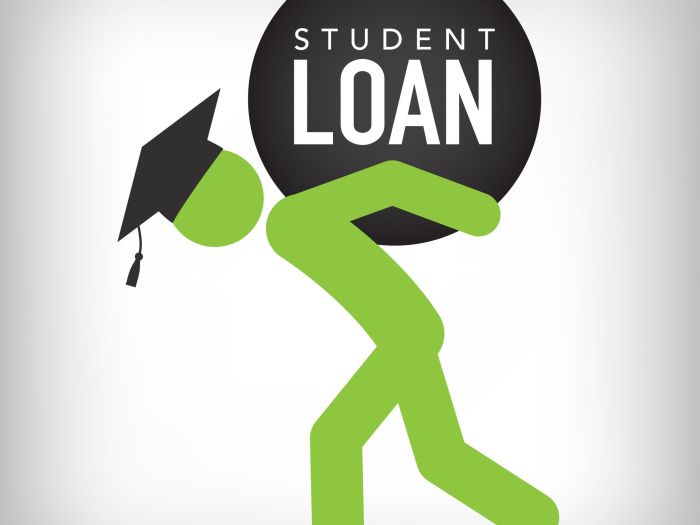
Student loan debt is a significant financial reality for millions, often casting a long shadow over credit scores and future financial prospects. Understanding how student loans impact your credit is crucial for long-term financial health. This guide unravels the complexities of student loan credit, providing insights into how repayment strategies, credit reporting, and forgiveness programs can influence your creditworthiness.
We’ll explore the mechanics of student loan reporting, offering practical strategies for managing debt while simultaneously building a strong credit profile. From understanding the impact of on-time payments to navigating alternative repayment options and the potential implications of loan forgiveness, this resource empowers you to take control of your financial future.
Understanding Student Loan Credit Impacts

Student loan debt significantly impacts your credit score, a crucial factor in obtaining loans, credit cards, and even some rental agreements. Understanding how your student loan repayment affects your credit is vital for managing your finances effectively and building a strong credit history. This section will detail the relationship between student loan repayment and credit scores, providing you with the information needed to navigate this important aspect of personal finance.
Effect of Student Loan Debt on Credit Scores
Student loans, like other forms of credit, are reported to credit bureaus. Your payment history on these loans directly influences your credit score. Consistent on-time payments contribute positively, while late or missed payments can significantly lower your score. The amount of student loan debt you carry also plays a role, as a high debt-to-income ratio can negatively affect your creditworthiness. Furthermore, the type of loan and repayment plan you choose can also influence the impact on your credit score.
Factors Influencing Credit Score Changes Due to Student Loan Repayment
Several factors influence how your student loan repayment affects your credit score. These include payment history (the most significant factor), the amount of debt you owe, your credit utilization ratio (the amount of credit you’re using compared to your total available credit), the length of your credit history, and the mix of credit accounts you have. A consistent history of on-time payments demonstrates responsible credit management, leading to a higher credit score. Conversely, late or missed payments signal a higher risk to lenders, resulting in a lower credit score. The longer your credit history with student loans, the more it can influence your overall score.
Examples of How Different Repayment Plans Affect Credit Scores
Different repayment plans can impact your credit score in various ways. For example, a standard repayment plan with consistent on-time payments will generally improve your credit score over time. However, income-driven repayment plans, while offering lower monthly payments, may not show the same positive impact immediately due to lower monthly payments being reported. Deferment or forbearance, while providing temporary relief from payments, often results in a negative impact on your credit score due to the reporting of the missed payments. It’s crucial to understand the implications of each repayment plan before choosing one.
Impact of On-Time Payments Versus Late or Missed Payments on Credit Reports
On-time payments are crucial for maintaining a good credit score. Each on-time payment demonstrates responsible financial behavior and contributes positively to your credit history. Conversely, late or missed payments are reported to credit bureaus and can significantly damage your credit score. The severity of the negative impact depends on the frequency and length of the delinquency. Even one missed payment can have a noticeable effect, while multiple missed payments can severely impact your creditworthiness for years. It’s crucial to prioritize on-time payments to protect your credit score.
Relationship Between Student Loan Debt and Credit Score Ranges
| Loan Amount | Payment History | Credit Score Impact | Repayment Plan Type |
|---|---|---|---|
| $10,000 | Consistent on-time payments | Positive impact, score increase likely | Standard Repayment |
| $50,000 | Consistent on-time payments | Positive impact, but potentially slower increase due to higher debt | Graduated Repayment |
| $20,000 | Multiple late payments | Significant negative impact, score decrease likely | Income-Driven Repayment |
| $30,000 | One missed payment | Negative impact, but less severe than multiple late payments | Standard Repayment |
Student Loan Credit Reporting and Agencies

Understanding how your student loans are reported to credit bureaus is crucial for maintaining a healthy credit score. Your repayment history directly impacts your creditworthiness, influencing your ability to secure loans, credit cards, and even housing in the future. This section details the process, key elements, and dispute procedures related to student loan credit reporting.
Student Loan Information Reporting to Credit Bureaus
Your student loan servicer, the company that manages your loan payments, reports your loan details to the three major credit bureaus: Equifax, Experian, and TransUnion. This reporting typically begins once you enter repayment, although some lenders may report information earlier. The servicer transmits data such as your loan balance, payment history (on-time or late payments), and account status (current, delinquent, or in default). The frequency of reporting varies by lender, but it’s generally monthly. Accurate and timely reporting is essential for building a positive credit history.
Key Elements of Student Loan Credit Reports
Your student loan information appears on your credit report as a tradeline. Key elements included are the lender’s name, your loan amount, the date the loan opened, your monthly payment amount, your payment history (including any missed or late payments), and the current loan balance. The account status (e.g., current, past due, charged-off) is also prominently displayed. These details contribute significantly to your credit score calculation. A consistent history of on-time payments is highly beneficial.
Disputing Inaccuracies on Student Loan Credit Reports
If you discover inaccuracies on your credit report related to your student loans, you have the right to dispute them. First, obtain copies of your credit reports from each of the three bureaus. Carefully review the information for any errors, such as incorrect loan amounts, inaccurate payment history, or wrong account status. If errors are found, submit a dispute letter to each bureau detailing the inaccuracies and providing supporting documentation (e.g., payment receipts, loan agreements). The bureaus are legally obligated to investigate your claim and correct any errors found.
Differences in Reporting Practices Among Lenders
While the core information reported is generally consistent across lenders, variations may exist in the frequency of reporting and the specific details included. Some lenders may report more frequently than others, and some may provide more granular details about your payment history. These differences are not necessarily indicative of better or worse reporting practices; rather, they reflect each lender’s internal procedures and systems. It’s crucial to stay informed about your loan status and monitor your credit reports regularly.
Steps to Improve Credit Scores Impacted by Student Loans
Making consistent, on-time payments is paramount. Here are additional steps to improve your credit score if it has been negatively impacted by student loans:
- Prioritize On-Time Payments: Even small delays can negatively affect your score. Set up automatic payments to avoid missed deadlines.
- Maintain a Low Credit Utilization Ratio: Keep your credit card balances low relative to your credit limits.
- Explore Loan Consolidation or Refinancing: This might simplify your payments and potentially lower your interest rate.
- Monitor Your Credit Reports Regularly: Check your reports from all three bureaus for errors or inconsistencies.
- Consider a Secured Credit Card: This can help build credit if you have limited credit history.
Strategies for Managing Student Loan Debt and Credit

Managing student loan debt while simultaneously building a strong credit history requires a proactive and well-organized approach. Successfully navigating this process involves careful budgeting, strategic repayment planning, and a thorough understanding of available resources. This section Artikels effective strategies to achieve both financial freedom and a positive credit score.
Step-by-Step Plan for Managing Student Loan Debt and Building Credit
A successful plan combines consistent loan repayment with credit-building activities. Begin by creating a comprehensive budget, meticulously tracking income and expenses. Allocate a dedicated portion of your income towards student loan repayment, prioritizing higher-interest loans first. Simultaneously, obtain a credit card with a low credit limit and utilize it responsibly, paying your balance in full each month. This demonstrates creditworthiness to lenders, boosting your credit score. Regularly monitor your credit report for accuracy and identify any potential issues promptly.
Effective Budgeting Techniques for Loan Repayment and Expenses
Effective budgeting is crucial for managing student loan debt. The 50/30/20 rule provides a useful framework: allocate 50% of your income to needs (housing, food, transportation), 30% to wants (entertainment, dining out), and 20% to savings and debt repayment. Utilize budgeting apps or spreadsheets to track your spending and identify areas for potential savings. Prioritize essential expenses and allocate a consistent amount to your student loan payments. Consider creating a separate savings account specifically for loan repayments to maintain discipline and track progress.
Alternative Repayment Options and Their Effects on Credit
Several alternative repayment options exist, each with different implications for your credit score. Income-Driven Repayment (IDR) plans adjust your monthly payments based on your income and family size. While these plans lower monthly payments, they often extend the repayment period, leading to higher overall interest paid and potentially a longer negative impact on your credit report if payments are missed. Deferment and forbearance temporarily postpone payments, but this negatively impacts your credit score unless specifically noted as such by the lender. Consolidation combines multiple loans into a single payment, potentially simplifying the process but possibly increasing the overall interest paid. Careful consideration of each option’s long-term financial and credit implications is vital. For example, a borrower with a high-interest loan might benefit from refinancing, even if it extends the repayment period slightly, if the overall interest paid is significantly reduced.
Benefits and Drawbacks of Credit Counseling Services
Credit counseling services offer guidance on managing debt and improving credit. Benefits include personalized budgeting advice, negotiation with creditors for lower interest rates or payment plans, and education on financial literacy. However, drawbacks include potential fees, the need for careful selection of reputable agencies, and the possibility of impacting your credit score temporarily due to inquiries and the establishment of a debt management plan. Reputable agencies are accredited by the National Foundation for Credit Counseling (NFCC). Before engaging with any credit counseling service, thoroughly research their reputation and fees to ensure they align with your needs and financial situation.
Comparison of Student Loan Repayment Strategies and Their Impact on Credit
| Repayment Strategy | Monthly Payment | Long-Term Credit Impact |
|---|---|---|
| Standard Repayment | Fixed, higher payments | Positive if payments are consistent and on time; faster debt payoff. |
| Income-Driven Repayment (IDR) | Variable, lower payments | Potentially negative if payments are missed or extended repayment period leads to higher total interest paid. |
| Refinancing | Potentially lower payments, variable rates | Positive if lower interest rates are secured and payments are consistent; can improve credit score over time with on-time payments. |
Conclusive Thoughts
Successfully navigating the landscape of student loans and credit requires proactive planning and a comprehensive understanding of the system. By employing effective budgeting techniques, choosing appropriate repayment plans, and staying informed about credit reporting practices, you can mitigate the negative impacts of student loan debt and build a solid credit foundation. Remember, responsible debt management is key to unlocking long-term financial stability and achieving your financial goals.
Helpful Answers
What if I can’t make my student loan payments?
Contact your loan servicer immediately. They can help you explore options like deferment, forbearance, or income-driven repayment plans to avoid default.
How long does it take for student loan payments to affect my credit score?
Your payment history is reported monthly, so positive or negative impacts are generally reflected relatively quickly. Consistent on-time payments will positively affect your score over time.
Can I get my student loans removed from my credit report?
No, paid student loans generally remain on your credit report for seven years from the date of your last payment. However, this positive payment history contributes to your creditworthiness.
Does paying off student loans quickly improve my credit score more?
While it doesn’t directly impact your score more than consistent on-time payments, reducing your debt-to-credit ratio can positively influence your score over time.
